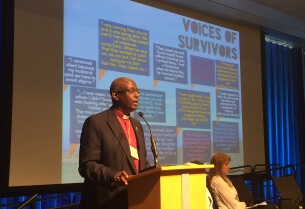By Susan Kim and others for Anglican Alliance
The conference on 7-9 July aimed to connect senior policymakers to research on how to work effectively in partnership with faith communities and faith-based organisations towards ending extreme poverty and promoting sustainable development.
Presenters underlined the central role of faith-based actors play inin provision of health care, working to end sexual and gender-based violence, addressing Ebola and HIV, and responding to humanitarian crises.
In his opening remarks, World Bank President Dr Jim Kim cited the Catholic social teaching for “a preferential option for the poor”. He said that every religion shares this fundamental commitment to the poorest and most vulnerable and that this provided a common platform with the international development community’s aim to end extreme poverty.
“We are the first generation in history that can say we can end extreme poverty in our lifetime,” Dr Kim said. “We can’t get there without all of you,” he added, addressing the faith communities. “We need prophetic voices to inspire us and evidence to lead the way.”
Revd Rachel Carnegie, co-executive director of the Anglican Alliance, spoke at the opening session and in a session on ending gender-based violence.
“It was a privilege to attend this conference and experience the range of speakers from faith-based, academic, UN and bilateral backgrounds,” Rachel said.
“We not only gained insights on the significant and distinctive contribution of faith-based actors in relief and development, but also examined the most effective mechanisms for building partnerships.”
“This long standing development debate about the value of faith partnerships appears to have made a gear change. Such partnerships have become, as one UN participant said, the ‘new normal’,” she said.
Rachel was citing Dr Azza Karam, senior advisor on culture for the United Nations Population Fund, who stated that the meeting at the World Bank had given this “new normal” of engagement with faith actors legitimacy.
Archbishop Bernard Ntahoturi of the Anglican Church of Burundi presented a case study in a conference session entitled “Sexual & Gender-Based Violence”. He shared a compelling portrayal of the role of the Church in working to end sexual violence. He talked of the importance of listening to the voices of survivors, creating the local church as a safe space to connect survivors with other services, transforming understandings of masculinities and ending the culture of impunity.
In Burundi, the Anglican Church, together with other faith-based organisations, has made a remarkable difference in the lives of people affected by this violence, Archbishop Bernard said. “We are called to have a concerted effort in areas of prevention, breaking the silence by denunciation, support for the victims, speaking out for the weak, the lonely, and the oppressed, without forgetting the power of prayer.”
Abagail Nelson, senior vice president of programmes at Episcopal Relief & Development, gave a presentation on the malaria initiative, Nets for Life. This included statistics on the remarkable and sustained impact of local church and community mobilisation on malaria prevention and treatment.
Abagail said, “We were really honoured to be part of this historic event, and also to be able to showcase the extraordinary work of all our partners in addressing the challenges of extreme poverty and marginalisation.”
The conference also saw the launch of the Lancet medical journal series on faith and health, with contributions from academics and practitioners focusing on the contributions and challenges of the faith sector on health promotion and service delivery.
The Global Conference on Religion and Sustainable Development was convened and co-hosted by the World Bank Group, German Federal Ministry for Economic Cooperation and Development, U.S. Agency for International Development, UK Department For International Development, GHR Foundation, World Vision and the Joint Learning Initiative on Faith and Local Communities, a coalition of faith-based organisations and academic institutions.
The conference attracted a unique combination of policy makers, multilateral and bilateral agencies, religious leaders, development professionals from faith-based organisations and academics.
The conference process focused on reviewing the evidence base and developing specific recommendations for action to strengthen effective partnerships between religious and faith-based groups and the public sector. It sought to obtain leadership commitments to follow-on activities and to establish specific next steps.
Proceedings of the Conference on Religion and Sustainable Development
Lancet Series on Faith-based Health Care
http://www.thelancet.com/series/faith-based-health-care.
Susan Kim is a writer for the World Council of Churches.
Photo credit: Archbishop Bernard Ntahoturi of the Anglican Church of Burundi speaking on the panel on gender based violence. By Peter Prove

